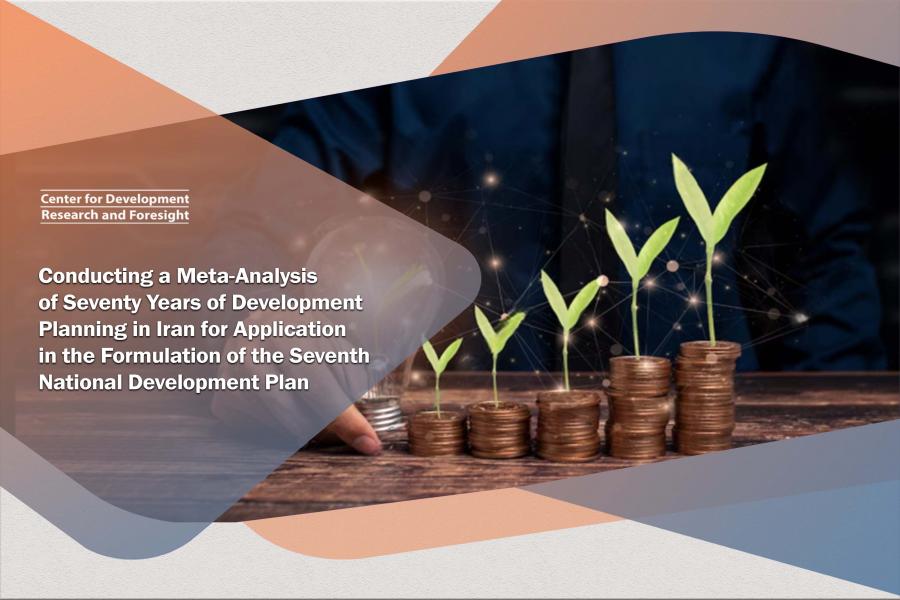
-
بررسی آییننامهها و دستورالعملهای برنامه هفتم پیشرفت
-
بررسی عوامل موثر بر افزایش تصادفات و تلفات جادهای و سوانح رانندگی و دادهکاوی تلفات انسانی
-
سازماندهی و بازآرایی فضایی آموزش عالی کشور
-
به روز رسانی سند ملی آمایش سرزمین
-
انجام مطالعات مناطق آزاد به عنوان نواحی پیشران اقتصادی کشور
-
اصلاح ساختار بودجه و پیاده سازی نظام یکپارچه مدیریت اطلاعات مالی دولت (IFMIS)

The development plan in Iran has been shaped by the evolution of the plan itself, following an established planning procedure. A crucial factor for successful planning is the establishment of a shared understanding and consensus on regulations, which serve as a blueprint for the content and structure of the plan among policymakers and planners. Given the importance of this issue, and recognizing that the formulation of regulations will be a pivotal step in advancing the seventh development plan, this study aims to delineate and clarify the regulatory elements of this plan.
To analyze previous development plans, a meta-analytic review spanning seventy years of development planning was conducted, focusing on the structural and content aspects of these plans and the concepts and propositions encapsulated within them. The investigations revealed that past programs lacked a fixed and clear framework, with each plan incorporating points deemed appropriate from the planners' perspective. Initially, the regulations of programs following the Islamic Republic of Iran's revolution placed more emphasis on the structural and formal categories of program development. However, as the programs progressed, there was a shift towards also addressing the content aspect and approaches to developing the plan.
Building upon this research, expert opinions were incorporated, and considering previous regulations that emphasized specific cases, elements were selected and proposed as the primary content and organization of the seventh development plan. These elements encompass a range of aspects, including process and timing, directions, level of detail, definitions of concepts, policies, requirements, themes and main focus, planning model, pathology, organization, preparation elements, and lessons learned.
Upon careful contemplation and repeated review of descriptive findings from studies spanning seventy years of development planning, it is evident that these studies have focused on various areas of planning and different dimensions of development studies. In alignment with the objective of this study, several elements from these regulations have been taken into account. However, it is noteworthy that frequent mentions in the collected statements can be categorized into two main parts: the main axes and themes of development planning, as well as the directions for development planning.
Finally, a summary of the meta-analysis, encompassing studies covering seventy years of development planning in the aforementioned areas, is presented in a subsequent table.
|
|
|
Description |
|
1 |
Themes |
Decentralization - compliance with land use principles - regional development planning |
|
orientation |
Strengthening the regional perspective and paying attention to the spatial aspect of development in the country's development planning |
|
|
2 |
Themes |
Adaptation to water scarcity - sustainability of natural resources |
|
orientation |
Suitability of development plans and construction measures with environmental capacities and prevention of destruction of natural resources |
|
|
3 |
Themes |
Social justice, combating poverty, social security and rural development and deprived areas |
|
orientation |
Creating and realizing social justice with an emphasis on reducing poverty, social security and paying attention to poor and rural areas |
|
|
4 |
Themes |
Reforming the administrative-executive structure, dealing with corruption and realizing the optimal reward system, strengthening the non-governmental sector in the economy, and making the government small and agil.
|
|
orientation |
Transformation in the executive-administrative structure of the country and optimal institutionalization based on the efficiency and agility of the government and the fair reward system |
|
|
5 |
Themes |
Sustainable participation, realization of development-oriented planning system, institutionalization of network decision-making and creation of synergy and consensus and establishment of optimal governance |
|
orientation |
Defining a development-oriented planning system, realizing network governance and strengthening the role of actors and stakeholders in the development planning system |
|
|
6 |
Themes |
Increasing social capital, increasing human capital, reducing social damage, improving the quality of the education system |
|
orientation |
Strengthening the human and social capital of the country with emphasis on improving the educational system and reducing social damage |
|
|
7 |
Themes |
Dealing with inflation and unemployment, economic growth, improving the level of production, reforming the tax system, increasing productivity and strengthening the knowledge-based economy. |
|
orientation |
Creating the basis for sustainable economic growth by reforming the production structure and increasing productivity with an emphasis on strengthening the knowledge-based economy |
|
|
8 |
Themes |
Integration of comprehensive planning with nuclear programming, strengthening the socio-cultural perspective in developing development plans, promoting development knowledge, independence of the planning institution and non-interference of non-experts, appropriate statistics and information, sustainable participation through the network of stakeholders and thinkers of planning and the future Perspective and flexibility |
|
orientation |
Rethinking and transformation in the common planning system of the country in terms of structure and content and the efficiency of the development planning process in the stages of preparation, formulation, implementation and monitoring. |



